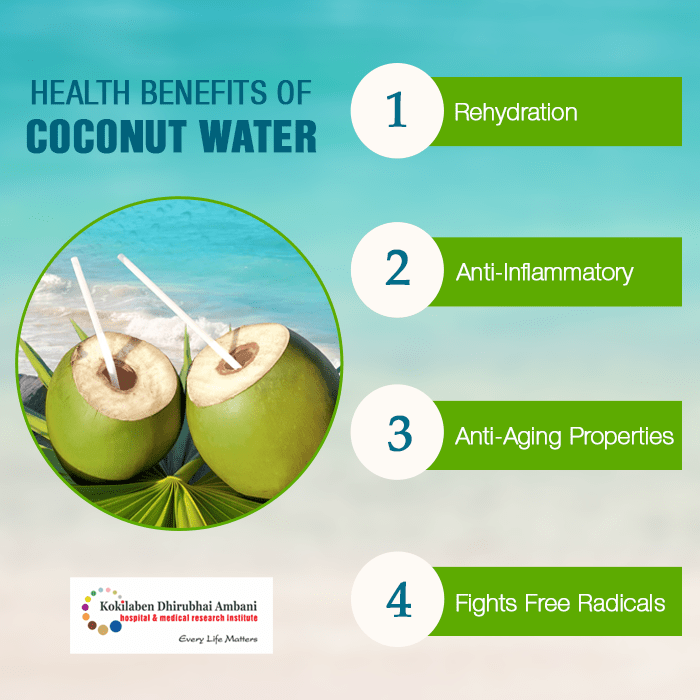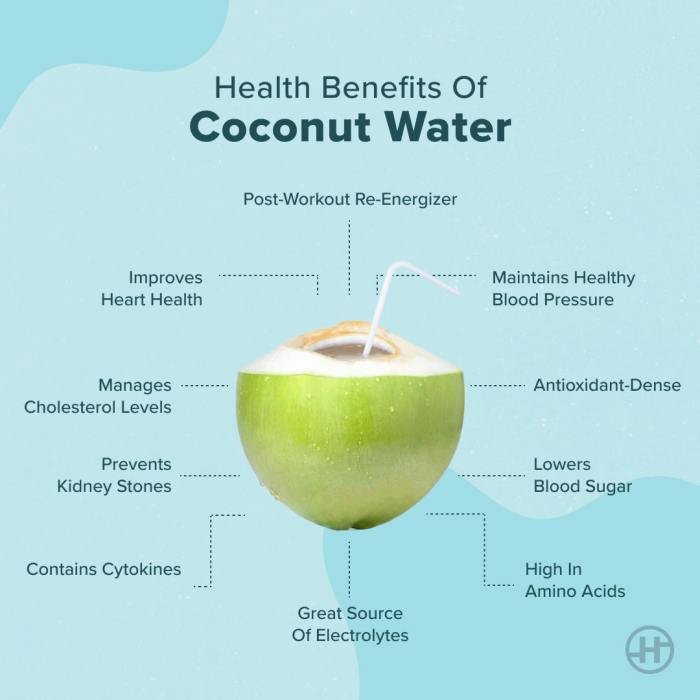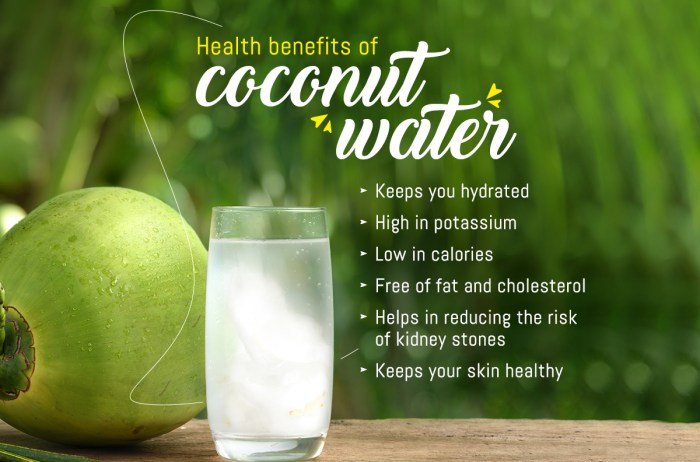Health benefit coconut water – Health benefits of coconut water, a tropical elixir, have gained immense popularity in recent years. This clear, slightly sweet liquid, harvested from young coconuts, offers a unique blend of nutrients and electrolytes that contribute to overall well-being. From boosting hydration to supporting cardiovascular health, coconut water is a versatile beverage with potential benefits that extend beyond its refreshing taste.
This guide explores the nutritional profile of coconut water, its role in hydration and electrolyte balance, and its potential benefits for cardiovascular health, digestive health, skin and hair health, and blood sugar regulation. We will also discuss potential risks and considerations, culinary applications, and answer frequently asked questions.
Nutritional Profile of Coconut Water

Coconut water is a refreshing and nutritious beverage that has gained popularity in recent years. It is a natural source of electrolytes, vitamins, and minerals, making it a healthy alternative to sugary drinks.
Key Nutrients in Coconut Water
Coconut water is a good source of several essential nutrients. These include:
- Electrolytes:Coconut water is rich in electrolytes, such as potassium, sodium, magnesium, and calcium, which are crucial for maintaining fluid balance and muscle function.
- Vitamins:Coconut water contains vitamins C, B complex, and riboflavin, which support various bodily functions, including immune health and energy production.
- Minerals:Coconut water is a good source of minerals like manganese, phosphorus, and iron, which are important for bone health, energy metabolism, and red blood cell production.
- Antioxidants:Coconut water contains antioxidants, such as phenolic compounds, which help protect cells from damage caused by free radicals.
Comparison with Other Beverages
Coconut water compares favorably to other popular beverages in terms of its nutritional content:
- Fruit Juice:While fruit juice provides vitamins and minerals, it is often high in sugar and calories. Coconut water, on the other hand, is naturally low in sugar and calories, making it a healthier option.
- Sports Drinks:Sports drinks are designed to replenish electrolytes lost during exercise. However, they are typically high in sugar and artificial ingredients. Coconut water offers a natural and less processed alternative for hydration and electrolyte replenishment.
Potential Health Benefits
The nutrients in coconut water offer potential health benefits:
- Hydration and Electrolyte Balance:Coconut water’s electrolyte content makes it an effective beverage for hydration, especially after exercise or during hot weather.
- Blood Pressure Regulation:The potassium in coconut water may help regulate blood pressure, which is beneficial for cardiovascular health.
- Digestive Health:Coconut water is a good source of fiber, which can promote digestive health and regularity.
- Immune System Support:The vitamins and antioxidants in coconut water may help strengthen the immune system and protect against infections.
Hydration and Electrolyte Balance
Coconut water is a natural, refreshing beverage that offers several health benefits, including its ability to effectively hydrate the body. Its unique composition, particularly its electrolyte content, makes it an excellent choice for replenishing fluids lost during exercise or periods of dehydration.
Electrolyte Content of Coconut Water
Electrolytes are essential minerals that carry an electrical charge and play a crucial role in regulating various bodily functions, including hydration. Coconut water is a natural source of electrolytes such as potassium, sodium, magnesium, and calcium. The electrolyte content of coconut water varies depending on the type of coconut and its maturity.
However, a typical 100 ml serving of coconut water provides approximately:
- Potassium: 250 mg
- Sodium: 25 mg
- Magnesium: 10 mg
- Calcium: 25 mg
Electrolyte Content Compared to Other Hydration Sources
When comparing the electrolyte content of coconut water to other hydration sources, it’s important to consider the specific electrolytes and their concentrations. For instance, sports drinks typically contain higher sodium levels, which can be beneficial for athletes who lose significant amounts of sodium through sweat.
However, coconut water offers a more balanced electrolyte profile, providing a good source of potassium, which is essential for maintaining proper hydration and muscle function.
- Sports drinks:High in sodium, often with added sugars, and artificial flavors.
- Water:Contains minimal electrolytes.
- Coconut water:Offers a natural, balanced electrolyte profile, particularly rich in potassium.
Role of Electrolytes in Hydration and Athletic Performance
Electrolytes play a crucial role in maintaining proper hydration and athletic performance. They help regulate fluid balance, nerve impulses, muscle contractions, and blood pressure. When electrolytes are lost through sweat, the body can become dehydrated, leading to fatigue, muscle cramps, and impaired performance.
Replenishing electrolytes through beverages like coconut water can help prevent these issues.
Coconut water is a great source of electrolytes, which are essential for hydration and recovery after a workout. If you’re looking for a place to get your workout on, consider checking out the Kearns Oquirrh Park Fitness Center. It offers a variety of fitness classes and equipment to help you reach your fitness goals.
And after your workout, don’t forget to replenish those electrolytes with a refreshing glass of coconut water.
“Electrolytes are essential for maintaining proper hydration, as they help regulate fluid balance and nerve impulses.”
Cardiovascular Health

Coconut water’s potential benefits for cardiovascular health have garnered significant attention, particularly its role in lowering blood pressure and improving cholesterol levels. This section explores the research supporting these claims and provides insights into incorporating coconut water into a heart-healthy diet.
Blood Pressure Regulation
Coconut water’s potassium content is a key factor in its potential blood pressure-lowering effects. Potassium is an essential mineral that helps regulate fluid balance and blood pressure. Studies have shown that consuming potassium-rich foods, including coconut water, can contribute to lowering blood pressure.
A study published in theJournal of the American College of Nutrition* found that consuming 480 ml of coconut water daily for four weeks significantly reduced systolic and diastolic blood pressure in individuals with prehypertension.
Cholesterol Management
While research on coconut water’s direct impact on cholesterol levels is limited, some studies suggest potential benefits. Coconut water’s natural electrolytes, including potassium and magnesium, may play a role in supporting heart health by promoting healthy blood pressure and reducing inflammation.
A study published in theInternational Journal of Food Sciences and Nutrition* found that consuming coconut water daily for eight weeks resulted in a modest reduction in total cholesterol levels in healthy adults.
Recommendations for Heart Health
Incorporating coconut water into a heart-healthy diet can be beneficial, but moderation is key. Here are some recommendations:
- Choose unsweetened coconut water to avoid added sugars, which can negatively impact heart health.
- Consume coconut water as part of a balanced diet that includes fruits, vegetables, whole grains, and lean protein.
- Consult with a healthcare professional to determine if coconut water is appropriate for your individual health needs.
Digestive Health

Coconut water’s role in digestive health is gaining attention, thanks to its potential to aid digestion and promote regularity. While it may not be a magic cure, coconut water’s unique composition offers benefits for the gut.
Beneficial Enzymes
Coconut water contains enzymes, which are proteins that catalyze chemical reactions within the body. These enzymes can aid in the breakdown of food, making digestion more efficient.
Fiber Content
While coconut water is naturally low in fiber, it does contain a small amount of soluble fiber. This type of fiber dissolves in water and forms a gel-like substance in the digestive tract, helping to regulate bowel movements and promote regularity.
Coconut water is a refreshing and hydrating beverage that offers a variety of health benefits, from boosting electrolytes to promoting healthy digestion. While researching these benefits, I stumbled upon a website offering mochi health reviews , which piqued my curiosity.
While the reviews focused on a different aspect of health, it reminded me of the importance of exploring various sources of information when it comes to our well-being. Coconut water, with its natural sweetness and nutrient-rich composition, continues to be a healthy and delicious choice for those seeking a natural boost.
Tips for Incorporating Coconut Water
Here are some ways to incorporate coconut water into your diet to support digestive health:
- Drink it first thing in the morning:Starting your day with coconut water can help stimulate digestion and prepare your gut for the day ahead.
- Pair it with meals:Drinking coconut water with meals can help aid digestion and prevent bloating.
- Use it in smoothies:Blending coconut water into smoothies can add a refreshing flavor and a boost of electrolytes, while also providing the digestive benefits.
- Replace sugary drinks:Coconut water is a healthier alternative to sugary sodas and juices, which can contribute to digestive issues.
Skin and Hair Health
Coconut water, renowned for its hydrating and electrolyte-rich properties, also offers potential benefits for skin and hair health. Its abundance of antioxidants, vitamins, and minerals contribute to its ability to nourish and protect the skin and hair from environmental damage.
Topical Applications of Coconut Water
Coconut water can be incorporated into various skincare and hair care routines due to its hydrating and nourishing properties.
- Face Mask:A simple DIY face mask can be made by mixing coconut water with ingredients like honey, yogurt, or mashed fruits. This mask helps hydrate, soothe, and brighten the skin.
- Hair Rinse:After shampooing, rinsing hair with coconut water can help moisturize and add shine. It can also help detangle hair and promote healthy hair growth.
- Skin Toner:Applying coconut water as a toner can help balance the skin’s pH level and minimize the appearance of pores.
Coconut Water’s Role in Promoting Hair Growth
Coconut water is rich in essential nutrients that are vital for healthy hair growth.
- Cytokinin:This plant hormone found in coconut water stimulates hair follicle activity, promoting hair growth.
- Minerals:Coconut water contains minerals like potassium, magnesium, and phosphorus, which contribute to hair strength and prevent breakage.
- Vitamins:Vitamins B and C, present in coconut water, are essential for healthy hair growth and scalp health.
Coconut Water’s Anti-Inflammatory Properties
Coconut water’s anti-inflammatory properties can help reduce skin inflammation caused by conditions like acne, eczema, and psoriasis. Its high levels of antioxidants neutralize free radicals, which contribute to inflammation.
Blood Sugar Regulation
Coconut water has gained popularity as a refreshing and nutritious beverage, and its potential role in blood sugar regulation has become a topic of interest.
Glycemic Index of Coconut Water
The glycemic index (GI) is a measure of how quickly a food raises blood sugar levels. Foods with a low GI are digested and absorbed slowly, resulting in a gradual rise in blood sugar. Coconut water has a low GI, typically ranging from 25 to 35, which is considered to be a healthy range.
This means that coconut water is unlikely to cause a significant spike in blood sugar levels.
Comparison with Other Beverages
Compared to other popular beverages, coconut water fares well in terms of its glycemic index. Fruit juices, particularly those made from concentrated fruit, have a higher GI, ranging from 40 to 70. Soda, which is primarily composed of sugar, has an extremely high GI, often exceeding 70.
Coconut water’s low GI, compared to fruit juices and soda, makes it a potentially healthier option for individuals concerned about blood sugar management.
Coconut water is a refreshing and hydrating beverage, packed with electrolytes that can help replenish your body after a workout. But beyond physical benefits, it can also play a role in supporting your overall well-being. For instance, staying hydrated is crucial for maintaining a healthy mind, and you can learn more about the connection between hydration and mental health on this website: mental health awa.
So, next time you’re looking for a healthy drink, reach for coconut water – it’s a delicious way to boost your physical and mental health.
Incorporating Coconut Water into a Diet, Health benefit coconut water
For individuals with diabetes or blood sugar concerns, incorporating coconut water into their diet should be done with caution and in moderation.
- Consult with a healthcare professional or registered dietitian for personalized recommendations.
- Monitor blood sugar levels closely after consuming coconut water.
- Consider choosing unsweetened coconut water, as added sugar can significantly increase the GI.
- Incorporate coconut water into a balanced diet that includes a variety of nutrient-rich foods.
Potential Risks and Considerations

While coconut water offers numerous health benefits, it’s essential to be aware of potential risks and considerations to ensure safe and enjoyable consumption. While generally safe for most individuals, certain factors can influence its suitability for consumption.
Potential Allergies
Coconut water, like other coconut products, can trigger allergic reactions in individuals sensitive to coconut. Symptoms of a coconut allergy can range from mild, such as skin rash or itching, to severe, including difficulty breathing or anaphylaxis. If you have a known allergy to coconut or other tree nuts, it’s crucial to avoid coconut water altogether.
Interactions with Medications
Coconut water contains potassium, which can interact with certain medications, particularly those that affect blood pressure or kidney function. Individuals taking diuretics, ACE inhibitors, or other medications that manage blood pressure should consult with their healthcare provider before consuming large quantities of coconut water.
Moderation in Consumption
While coconut water is a refreshing and nutritious beverage, moderation is key. Excessive consumption can lead to an imbalance in electrolytes, particularly potassium. High potassium levels can be harmful, especially for individuals with kidney problems or those taking medications that affect potassium levels.
Choosing High-Quality Products
To maximize the benefits of coconut water and minimize potential risks, it’s important to choose high-quality products. Look for:
- Products labeled as “100% coconut water” with no added sugars, flavors, or preservatives.
- Products sourced from young, green coconuts, as they tend to have a higher concentration of electrolytes and nutrients.
- Products that are pasteurized to ensure safety and quality.
- Products with a clear and concise label listing ingredients and nutritional information.
Coconut Water in Culinary Applications: Health Benefit Coconut Water

Coconut water, with its refreshing taste and versatility, has found its way into a variety of culinary creations. From its use as a base for smoothies and soups to its inclusion in desserts and sauces, coconut water adds a unique flavor dimension to many dishes.
Coconut Water in Recipes
Coconut water’s subtle sweetness and natural electrolytes make it a perfect addition to various recipes. Here are some ways to incorporate coconut water into your culinary creations:
| Recipe Type | Applications | Examples |
|---|---|---|
| Smoothies | Use coconut water as a base for smoothies, blending it with fruits, vegetables, and other ingredients. | Tropical smoothie with mango, pineapple, and coconut water. |
| Soups | Add coconut water to soups for a light and refreshing flavor, particularly in Asian-inspired dishes. | Thai coconut curry soup with chicken, vegetables, and coconut water. |
| Desserts | Incorporate coconut water into desserts like panna cotta, ice cream, and sorbet for a subtle sweetness and a hint of coconut flavor. | Coconut water panna cotta with mango and lime. |
| Sauces | Use coconut water to create light and flavorful sauces for stir-fries, marinades, and dressings. | Coconut water-based teriyaki sauce for grilled chicken. |
| Beverages | Enjoy coconut water on its own as a refreshing and hydrating beverage. | Coconut water with a squeeze of lime or a dash of ginger. |
Flavor Profile of Coconut Water
Coconut water possesses a delicate sweetness with a subtle hint of coconut flavor. Its light and refreshing taste complements a wide range of ingredients, from fruits and vegetables to spices and herbs. The subtle sweetness of coconut water enhances the natural flavors of dishes without overpowering them.
Its unique flavor profile makes it an ideal addition to both sweet and savory recipes.
Final Review

Coconut water, a natural powerhouse, provides a refreshing and nutritious alternative to other beverages. Its versatility allows for integration into various culinary creations, enhancing flavor while offering health benefits. While enjoying its refreshing taste, remember to consume it in moderation and consult with a healthcare professional if you have any concerns or allergies.
Top FAQs
Is coconut water good for weight loss?
Coconut water is naturally low in calories and fat, making it a suitable choice for those looking to manage their weight. However, it’s essential to consider it as part of a balanced diet and exercise regimen for effective weight management.
Can coconut water help with kidney stones?
Some anecdotal evidence suggests that coconut water may help prevent kidney stones due to its high potassium content. However, further research is needed to confirm this claim. If you have kidney stones or concerns, consult with a healthcare professional.
Is coconut water safe for pregnant women?
Coconut water is generally considered safe for pregnant women in moderation. However, it’s always advisable to consult with a healthcare professional before consuming any new food or beverage during pregnancy.